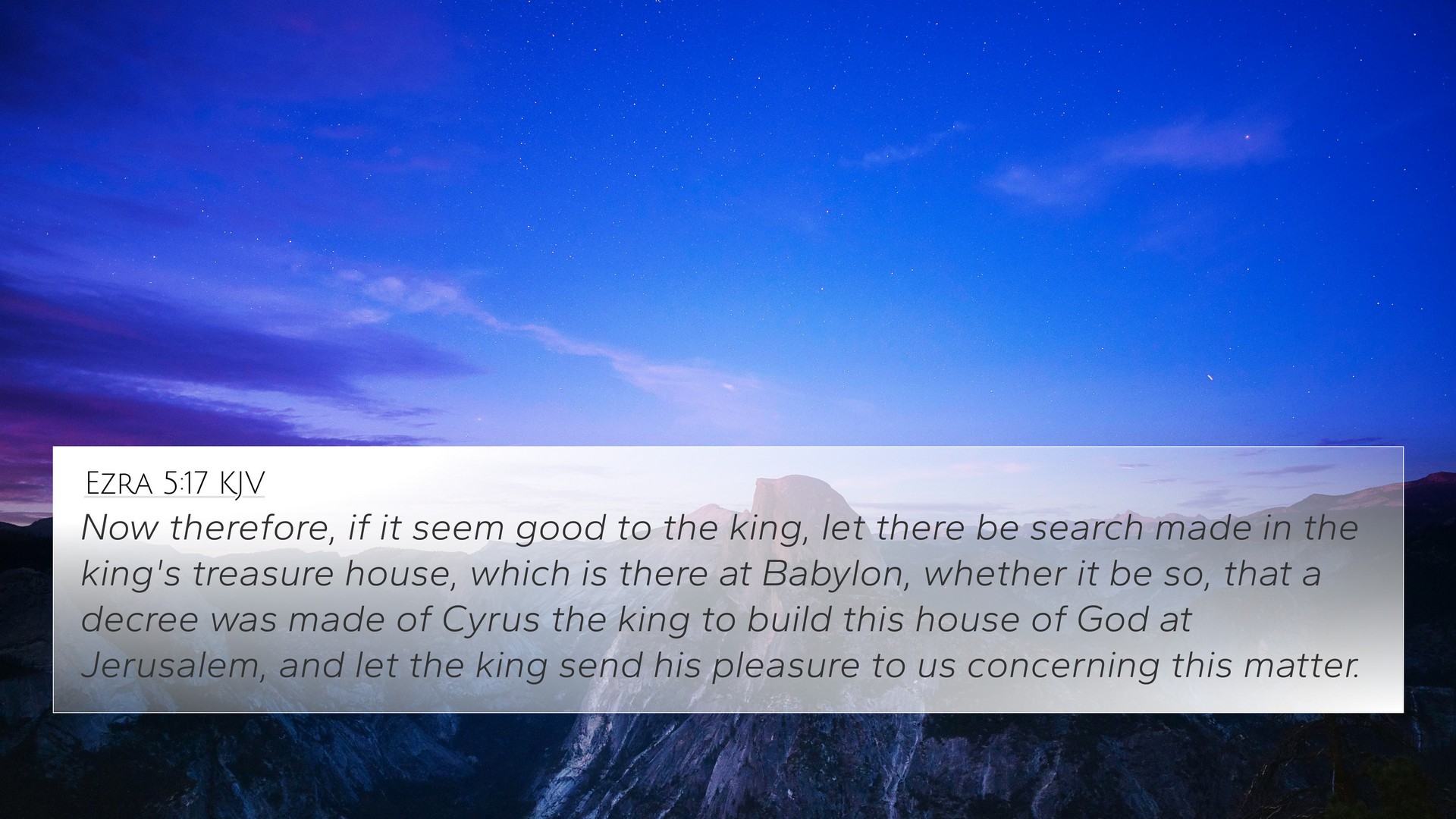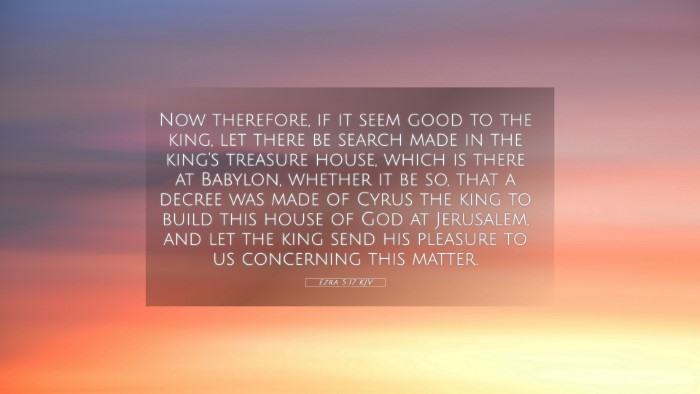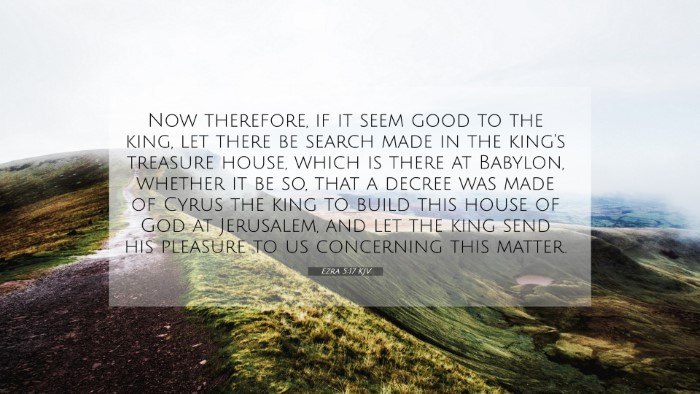Old Testament
Genesis Exodus Leviticus Numbers Deuteronomy Joshua Judges Ruth 1 Samuel 2 Samuel 1 Kings 2 Kings 1 Chronicles 2 Chronicles Ezra Nehemiah Esther Job Psalms Proverbs Ecclesiastes Song of Solomon Isaiah Jeremiah Lamentations Ezekiel Daniel Hosea Joel Amos Obadiah Jonah Micah Nahum Habakkuk Zephaniah Haggai Zechariah MalachiEzra 5:17 Similar Verses
Ezra 5:17 Cross References
Now therefore, if it seem good to the king, let there be search made in the king's treasure house, which is there at Babylon, whether it be so, that a decree was made of Cyrus the king to build this house of God at Jerusalem, and let the king send his pleasure to us concerning this matter.
Uncover the Rich Themes and Topics of This Bible Verse
Listed below are the Bible themes associated with Ezra 5:17. We invite you to explore each theme to gain deeper insights into the Scriptures.
Ezra 5:17 Cross Reference Verses
This section features a detailed cross-reference designed to enrich your understanding of the Scriptures. Below, you will find carefully selected verses that echo the themes and teachings related to Ezra 5:17 KJV. Click on any image to explore detailed analyses of related Bible verses and uncover deeper theological insights.
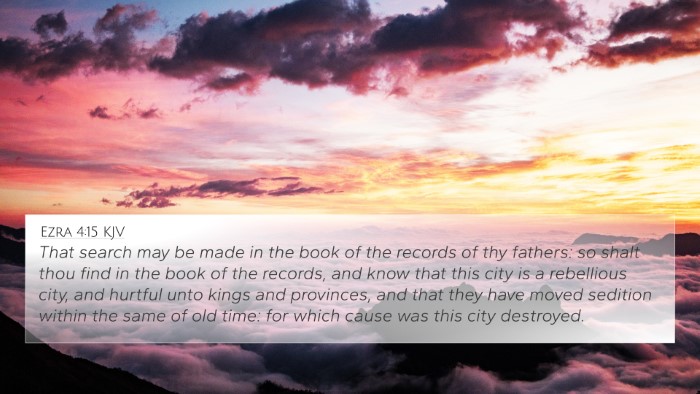
Ezra 4:15 (KJV) »
That search may be made in the book of the records of thy fathers: so shalt thou find in the book of the records, and know that this city is a rebellious city, and hurtful unto kings and provinces, and that they have moved sedition within the same of old time: for which cause was this city destroyed.
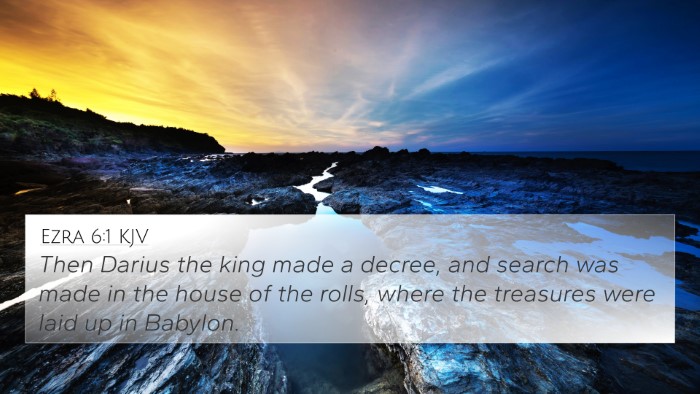
Ezra 6:1 (KJV) »
Then Darius the king made a decree, and search was made in the house of the rolls, where the treasures were laid up in Babylon.
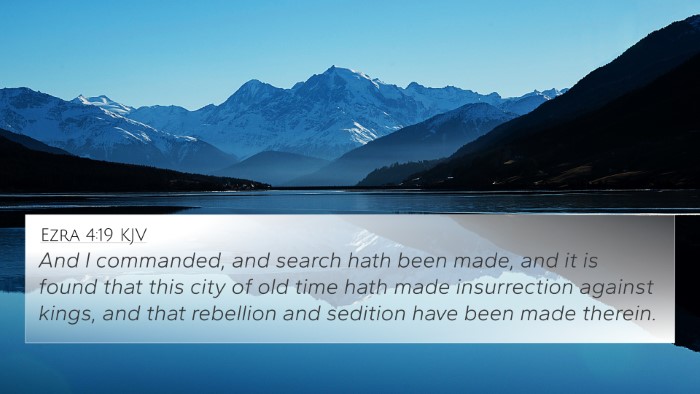
Ezra 4:19 (KJV) »
And I commanded, and search hath been made, and it is found that this city of old time hath made insurrection against kings, and that rebellion and sedition have been made therein.

Proverbs 25:2 (KJV) »
It is the glory of God to conceal a thing: but the honour of kings is to search out a matter.
Ezra 5:17 Verse Analysis and Similar Verses
Ezra 5:17 - Summary of Meaning and Insights
Ezra 5:17 states: "Now therefore, if it seem good to the king, let there be search made in the king's treasure house, which is there at Babylon, whether it be so that a decree was made of Cyrus the king to build this house of God at Jerusalem, and let the king send his pleasure to us concerning this matter." This verse reflects the ongoing struggle and diligence of the Jewish people as they sought to rebuild the temple in Jerusalem after their exile.
Contextual Analysis
In this passage, the context involves the opposition faced by the returned exiles and their work on the temple. The leaders of these exiles, notably Zerubbabel and Jeshua, faced challenges both from local adversaries and administrative confusion regarding earlier edicts by Cyrus. This verse is a crucial turning point where the Tatnai, the governor beyond the river, appeals to the king regarding the legitimacy of the temple reconstruction.
Insights from Commentaries
-
Matthew Henry:
Henry emphasizes the significance of seeking divine guidance in the reconstruction efforts. He notes that the search in the king's treasury represents a deeper inquiry into historical documents that validate the claims of the Jewish people, reminding us of God's providence in historical events.
-
Albert Barnes:
Barnes highlights the political maneuvers at play in this verse. He points out that the careful record-keeping by the Persian Empire allowed for the verification of documents, showcasing God's sovereignty even in the secular realm.
-
Adam Clarke:
Clarke explains the importance of the decree of Cyrus, stating that this was crucial for establishing authority for the Jews to rebuild their temple. He interprets this as an act of God using a foreign king to support His chosen people.
Key Themes and Connections
This verse highlights the themes of authority, legitimacy, and divine intervention. It reflects the historical and theological dynamics at play during the return from exile, showing how God's plans often unfold through various means, including governmental structures.
There are several notable Bible cross-references connected to Ezra 5:17:
- 2 Chronicles 36:22-23 - The decree of Cyrus for building the temple.
- Isaiah 44:28 - Prophecy about Cyrus allowing Israel to return and build.
- Haggai 1:1 - A call to rebuild the temple given by the prophets.
- Daniel 6:2 - Reference to the satraps and administrators under a king.
- Nehemiah 2:1-5 - Nehemiah’s response to the king about Jerusalem's ruins.
- Ezra 1:1-4 - Cyrus' proclamation regarding the return to Jerusalem.
- Matthew 28:18 - Christ’s authority to send out His disciples parallels civic authority.
Cross-Referencing Biblical Texts
For effective understanding, utilizing a Bible cross-reference guide can provide deeper insights into the thematic connections between the verses, establishing a more significant comprehension of the narratives and doctrines presented throughout the scriptures.
Tools for Bible Cross-Referencing
Using tools such as a Bible concordance or an online Bible cross-reference system can significantly enhance one’s study, making it easier to explore connections between the Old and New Testaments. By employing cross-reference Bible study methods, one can identify specific themes or teachings that resonate across various books.
Exploring Inter-Biblical Dialogue
This verse invites readers to engage in an inter-Biblical dialogue where various scriptures speak to one another. For instance, the rebuilding efforts in Ezra mirrors the restoration themes found in the prophetic books such as Jeremiah and Ezekiel, establishing continuity in God's covenant promises.
Conclusion
Understanding Ezra 5:17 involves recognizing the broader narrative of God’s faithfulness during the exile and the return, along with the political and social dynamics of the time. By cross-referencing with related scriptures, one can appreciate how interconnected these themes are throughout the Bible.
Further Study Recommendations
- Comparative study of Pauline epistles reveals insights into apostolic authority.
- Investigate bible verses related to faith and rebuilding for a thematic approach.
- Engage in cross-referencing Psalms with New Testament teachings for deeper understanding.
